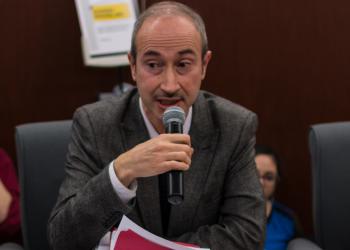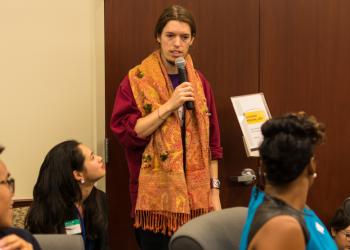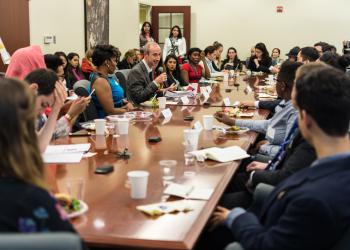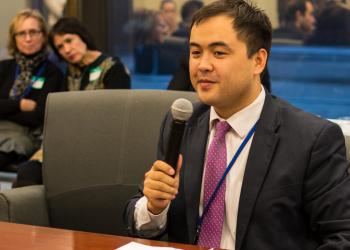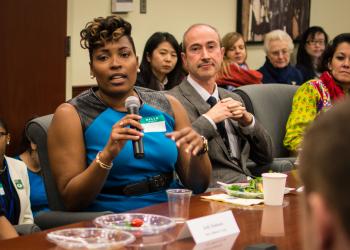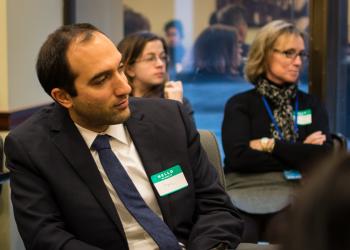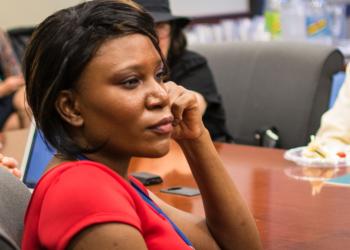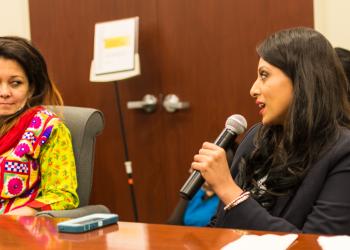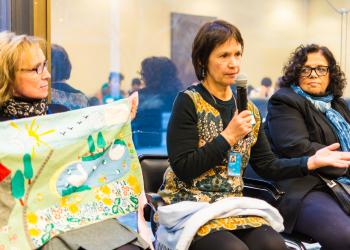Young people get involved in climate discourse at the UN
There is little doubt that climate change’s impact will be the greatest on future generations. As such, policy makers increasingly recognize the importance of engaging young people in discussions on climate action.
One such venue for youth involvement was a recent briefing at the United Nations, titled “Youth at the Forefront: Addressing the Disconnect Between Climate Awareness and Action,” which was sponsored by the UN’s Department of Public Information.
The 12 November 2015 event brought together more than 450 participants, including UN staff, civil society representatives, and many high school and university students. It sought to equip them with tools to transform knowledge into action.
“Young people everywhere know what is at stake if we do not participate in creating changes to curb emissions and to inspire others to do the same,” said Amanda Nesheiwat, a youth representative for the Foundation for Post-Conflict Development, who moderated the briefing, which can be viewed as an archived webcast here.
The opportunity for discourse on the topic was extended at a lunch-time meeting after the briefing, hosted by the Baha’i International Community at its offices in New York. The meeting drew some 75 participants, offering the chance for face-to-face exchange in a more informal setting.
A major focus of both events was how youth can be involved in the lead-up to, and follow-up from, next month’s United Nations Conference on Climate Change in Paris, which is also known as COP-21.
In the discussion at the Baha’i offices, Francois Gave, Counsellor for development and sustainable development at the Permanent Mission of France to the UN, said that while the agreements among governments that emerge from Paris will be critical in stopping climate change, long term involvement from civil society – and especially young people – will be critical in ensuring its lasting success.
“Paris is really important, but it's only the starting point,” said Mr. Gave. “If we want to have a lasting agreement, we need broad-based, continuous support after Paris to make sure we really keep on track.”
Mr. Gave added: “We need the support of the younger generation for the success of COP-21, and for the success of solving climate change.”
Youth participants echoed that and offered other insights about how lasting action can be undertaken.
“We have over one million students in New York public schools,” said Victoria Barrett, a high school student at Notre Dame School in New York. “Just a very small number of them would be able to have a conversation about climate change. It’s important to make this part of our education, our conversations.”
Ted Hall, another participant, offered: “We need the older generation to step up and help us build the institutions that we've never seen, to help us with the planet they left us.”
Lisa Russell, a documentary filmmaker, said when climate change is framed as a “justice issue,” it “really galvanizes young people.”
“If you come at people with CO2 statistics, you lose people. It's important to engage people,” said Ms. Russell, who is currently behind a creative social action initiative called “I Sell the Shadow.”
Saphira Rameshfar, a representative of the Baha’i International Community to the United Nations, suggested an important theme for consideration is the manner in which individual actions must be combined with community efforts, while also supported by institutions or governments.
We’re not isolated individuals,” said Ms. Rameshfar. “We’re not isolated countries. We are part of an interrelated whole.”
Her colleague Serik Tokbolat elaborated on the necessity of understanding how individuals, communities, and institutions must interact and work together on social issues like climate.
“Individual choices and governmental action are often subtly placed in opposition to one another, suggesting that one or the other either takes or deserves precedence,” said Mr. Tokbolat, who is also a BIC representative to the UN.
“In reality, of course, both are needed. Agreements and protocols at the governmental level will not be sufficient if individuals do not adopt more sustainable lifestyles and behaviors. Similarly, individual actions alone – conserving water, reducing waste – will not be sufficient if governments do not make the necessary changes at the structural level.
“If the government has done everything, but people don’t change their mindsets and want to drive luxury cars instead of taking public transport, then nothing will change,” said Mr. Tokbolat. “If we still think that to be a successful person, you have to drive a luxury car, we will never change anything.
“Both the government and individuals need to do something. Who will talk about these ethics and values? The community will talk about these issues. The community is the environment in which we can talk about these green ideas,” said Mr. Tokbolat.
The discussion at the BIC was supported by The World We Want campaign. A video showing some elements of the BIC lunch discussion can be viewed here.
